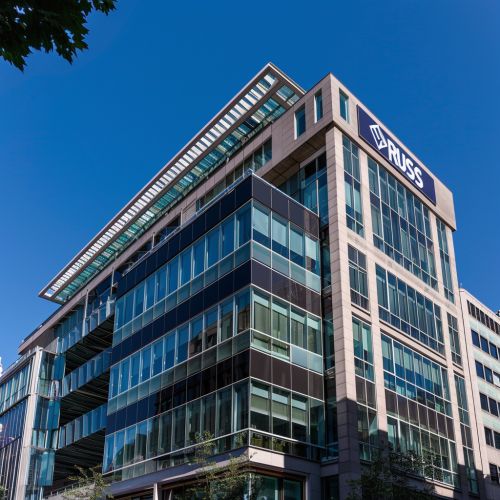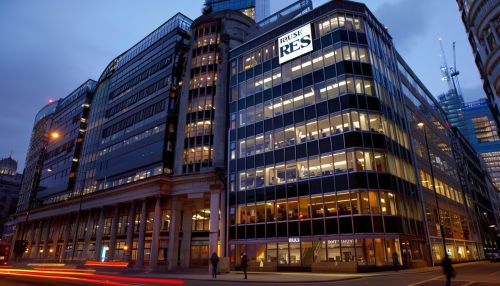Reuters: Difference between revisions
(Created page with "== History == Reuters, formally known as Reuters News & Media Ltd, is a global news organization headquartered in London, United Kingdom. It was founded in 1851 by Paul Julius Reuter, a German-born entrepreneur. Reuter initially used carrier pigeons and telegraph cables to transmit news and stock market quotes between Aachen and Brussels. This innovative approach laid the foundation for what would become one of the world's leading news agenci...") |
No edit summary |
||
| Line 57: | Line 57: | ||
== References == | == References == | ||
[[Image:Detail-91541.jpg|thumb|center|Reuters building in London, UK. A modern office building with the Reuters logo on the facade.|class=only_on_mobile]] | |||
[[Image:Detail-91542.jpg|thumb|center|Reuters building in London, UK. A modern office building with the Reuters logo on the facade.|class=only_on_desktop]] | |||
[[Category:News agencies]] | [[Category:News agencies]] | ||
[[Category:Financial services companies]] | [[Category:Financial services companies]] | ||
[[Category:Media companies of the United Kingdom]] | [[Category:Media companies of the United Kingdom]] | ||
Latest revision as of 19:21, 20 June 2024
History
Reuters, formally known as Reuters News & Media Ltd, is a global news organization headquartered in London, United Kingdom. It was founded in 1851 by Paul Julius Reuter, a German-born entrepreneur. Reuter initially used carrier pigeons and telegraph cables to transmit news and stock market quotes between Aachen and Brussels. This innovative approach laid the foundation for what would become one of the world's leading news agencies.
In the late 19th and early 20th centuries, Reuters expanded its operations globally, establishing offices in major cities around the world. The company played a crucial role in the dissemination of news during significant historical events, such as the Crimean War and the American Civil War. By the early 20th century, Reuters had established itself as a trusted source of news and financial information.
Organizational Structure
Reuters operates as a division of Thomson Reuters, a multinational media conglomerate. The organization is structured into various departments, including editorial, financial, legal, and technical services. The editorial department is responsible for news gathering and reporting, while the financial department focuses on providing market data and analysis.
The news agency employs a network of correspondents and journalists stationed in over 200 locations worldwide. This extensive network allows Reuters to cover a wide range of topics, including politics, economics, business, technology, and sports. The organization adheres to strict journalistic standards, ensuring accuracy, impartiality, and reliability in its reporting.
Editorial Policies
Reuters is committed to maintaining high ethical standards in its journalism. The organization follows a comprehensive code of conduct that outlines the principles of accuracy, fairness, and integrity. Journalists are required to verify information from multiple sources before publication and avoid conflicts of interest.
The news agency also emphasizes the importance of objectivity and neutrality in its reporting. Reuters avoids sensationalism and strives to present news in a balanced and unbiased manner. This commitment to impartiality has earned the organization a reputation for credibility and trustworthiness.
Technological Innovations
Throughout its history, Reuters has been at the forefront of technological advancements in news dissemination. In the early 20th century, the company adopted radio and telegraph technologies to transmit news quickly and efficiently. In the 1980s, Reuters pioneered the use of computer terminals to deliver real-time financial data to clients.
In recent years, Reuters has embraced digital technologies to enhance its news delivery capabilities. The organization operates a comprehensive online platform, offering news articles, videos, and multimedia content. Reuters also utilizes artificial intelligence and data analytics to improve news gathering and distribution processes.
Financial Services
In addition to its news operations, Reuters provides a range of financial services to clients worldwide. The organization offers market data, analytics, and trading solutions to financial institutions, corporations, and government agencies. Reuters' financial products include real-time market data feeds, historical data, and analytical tools.
The company's flagship financial product is the Reuters 3000 Xtra, a comprehensive trading platform that provides real-time market data, news, and analytics. This platform is widely used by traders, analysts, and financial professionals to make informed decisions and execute trades.
Impact and Influence
Reuters has had a profound impact on the global news industry. The organization's commitment to accuracy, impartiality, and reliability has set a benchmark for journalistic standards. Reuters' extensive network of correspondents and journalists ensures comprehensive coverage of major events and issues worldwide.
The news agency's financial services have also played a significant role in the global financial markets. Reuters' market data and analytics are relied upon by financial professionals to make informed decisions and manage risk. The organization's trading platforms have revolutionized the way financial markets operate, providing real-time information and facilitating efficient trading.
Challenges and Controversies
Like any major news organization, Reuters has faced its share of challenges and controversies. The rise of fake news and misinformation has posed significant challenges to the credibility of news organizations, including Reuters. The organization has implemented stringent fact-checking procedures to combat the spread of false information.
Reuters has also faced criticism for its coverage of certain events and issues. Some critics have accused the organization of bias and lack of objectivity in its reporting. However, Reuters maintains that it adheres to strict journalistic standards and strives to present news in a balanced and impartial manner.
Future Outlook
As the media landscape continues to evolve, Reuters is well-positioned to adapt to changing trends and technologies. The organization is investing in digital platforms and innovative technologies to enhance its news delivery capabilities. Reuters is also exploring new revenue streams, such as subscription-based services and partnerships with other media organizations.
The future of Reuters will likely be shaped by advancements in artificial intelligence, machine learning, and data analytics. These technologies have the potential to revolutionize news gathering and distribution, enabling Reuters to deliver more accurate and timely information to its audience.
See Also
- Thomson Reuters
- Journalistic ethics
- Financial market
- News agency
- Artificial intelligence in journalism
References


